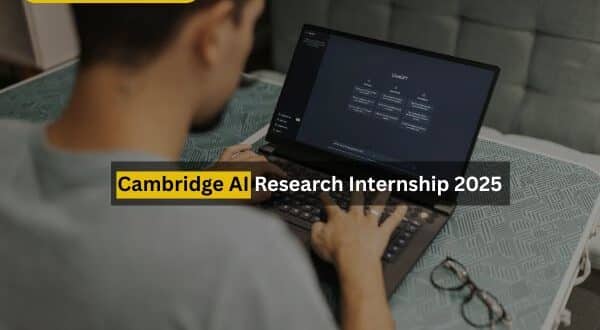Are you passionate about artificial intelligence, fintech, and cutting-edge policy research? The 2025 Artificial Intelligence (AI) Research Internship at the University of Cambridge offers a rare opportunity to work remotely with one of the world’s most prestigious research centres. Whether you’re a final-year undergraduate, a graduate student, or a PhD researcher, this internship can significantly boost your career in the AI and financial sectors.
Hosted by the Cambridge Centre for Alternative Finance (CCAF), this internship connects you to meaningful global research on AI adoption in financial services, regulators, and technology firms. And the best part? It’s open worldwide, remote, paid, and flexible in duration.
About the University of Cambridge & CCAF
The University of Cambridge ranks #2 in the 2025 QS World University Rankings, renowned globally for research excellence. Its Cambridge Centre for Alternative Finance (CCAF) is a leader in global fintech research, particularly on digital financial services, regulation, and now AI.
Cambridge AI Research Internship 2025 Overview
| Feature | Details |
| Internship Name | Artificial Intelligence (AI) Research Internship |
| Host | University of Cambridge, CCAF |
| Internship Type | Research Internship |
| Duration | 3–6 months (extendable) |
| Mode | Remote-first (Onsite possible) |
| Time Commitment | Part-time (20 hrs/week) or Full-time (37.5 hrs/week) |
| Start Date | August/September 2025 |
| Deadline to Apply | 30 August 2025 |
| Eligibility | Global students & professionals with AI/finance background |
| Financial Support | Up to £800/month (full-time), £400/month (part-time) |
Why Join the Cambridge AI Research Internship?
- Work remotely with a world-leading academic institute
- Gain real-world experience in AI research and regulation
- Receive financial reimbursement of up to £800/month
- Engage with policymakers, regulators, and fintech experts
- Access Cambridge knowledge-sharing events and resources
- Contribute to published policy and research papers
- Receive a completion certificate to strengthen your CV
- Get acknowledged in CCAF’s global publications
Focus Areas of Internship
When applying, you can select your preferred domain:
- AI Third Party Vendors: Firms developing AI services for the financial industry
- AI in Financial Authorities: Central banks, regulators, and supervisory bodies
- AI in Financial Industry: Traditional institutions, fintechs, and banks using AI
What Will You Do?
As a research intern, you will:
- Conduct outreach and ecosystem mapping for AI adoption
- Perform data collection and desk-based research
- Assist in conducting interviews and serve as notetaker
- Support hypothesis building, validation, and final analysis
- Help write and structure final reports and publications
- Contribute to data visualisation and presentation
- Participate in knowledge-sharing sessions and dissemination activities
Who Can Apply?
This program is ideal for:
- Final-year undergraduates, master’s students, or PhD candidates
- Individuals from finance, economics, AI, data science, public policy, or related fields
- Professionals with experience in the financial services, fintech, or regulatory authorities
- Applicants with strong writing, data analysis, and research skills
- Global applicants from any country (remote format)
Essential Requirements
- Strong understanding of AI in the financial ecosystem
- Prior academic or work experience related to AI, fintech, or finance
- Excellent communication and writing skills
- Confidence in using Microsoft Office Suite
- Ability to work independently and as part of a team
- Organized and responsible time manager
Internship Timeline
- Application Deadline: 30 August 2025
- Interviews & Decisions: Rolling basis (August/September 2025)
- Internship Start: August or September 2025
- Duration: 3–6 months with possible extension
- Format: Remote (onsite option in Cambridge may be offered)
How to Apply (2 Easy Steps)
Step 1: Download the Internship Application Form (PDF)
Step 2: Send your completed form along with the following to [email protected]:
• Your CV/resume
• A writing sample
• Any other supporting documents
Comparison with Similar Global Opportunities
| Program | Host | Duration | Format | Monthly Support | Eligibility |
| Cambridge AI Research Internship | University of Cambridge | 3–6 months | Remote | £400–800 | Global, AI/Finance background |
| Google Research Internship | 3 months | Hybrid | Paid (varies) | Students in CS/Data/AI | |
| DAAD RISE | Germany Universities | 3 months | Onsite | €934/month + travel | Undergraduate STEM students |
| World Bank IFC Internship | IFC, World Bank | 2–3 months | Hybrid | Competitive stipend | Master’s/PhD students |
FAQs About Cambridge AI Research Internship 2025
- Is this internship fully remote?
Yes. It’s a remote-first internship open globally. Onsite work in Cambridge may be considered. - Can undergraduates apply?
Yes, final-year undergrads with strong writing and research samples are welcome. - Is University of Cambridge Remote Internship paid?
Yes. You may receive up to £800/month (full-time) or £400/month (part-time) depending on circumstances. - What documents are required?
Completed application form, CV, writing sample, and optional support documents. - What kind of writing sample should I send?
Any academic, policy, or technical writing related to AI, finance, or research. - How many hours is part-time vs. full-time?
Part-time is 20 hours/week. Full-time is 37.5 hours/week. - Do I need prior AI experience?
A good understanding of AI in finance or policy is required. Hands-on experience is a plus. - Will I get a certificate?
Yes. You will receive a certificate upon successful completion. - Can I choose which area of AI to focus on?
Yes. Indicate your preferred focus area when applying. - What is the selection process for University of Cambridge Remote Internship?
Rolling interviews and decisions based on your documents and fit with the research focus.
This is your chance to collaborate with one of the world’s top universities on cutting-edge AI research in the financial sector. APPLY NOW, contribute to meaningful policy work, and build a global research network.
 Opportunities Path Ultimate Guide to a Brighter Future
Opportunities Path Ultimate Guide to a Brighter Future
